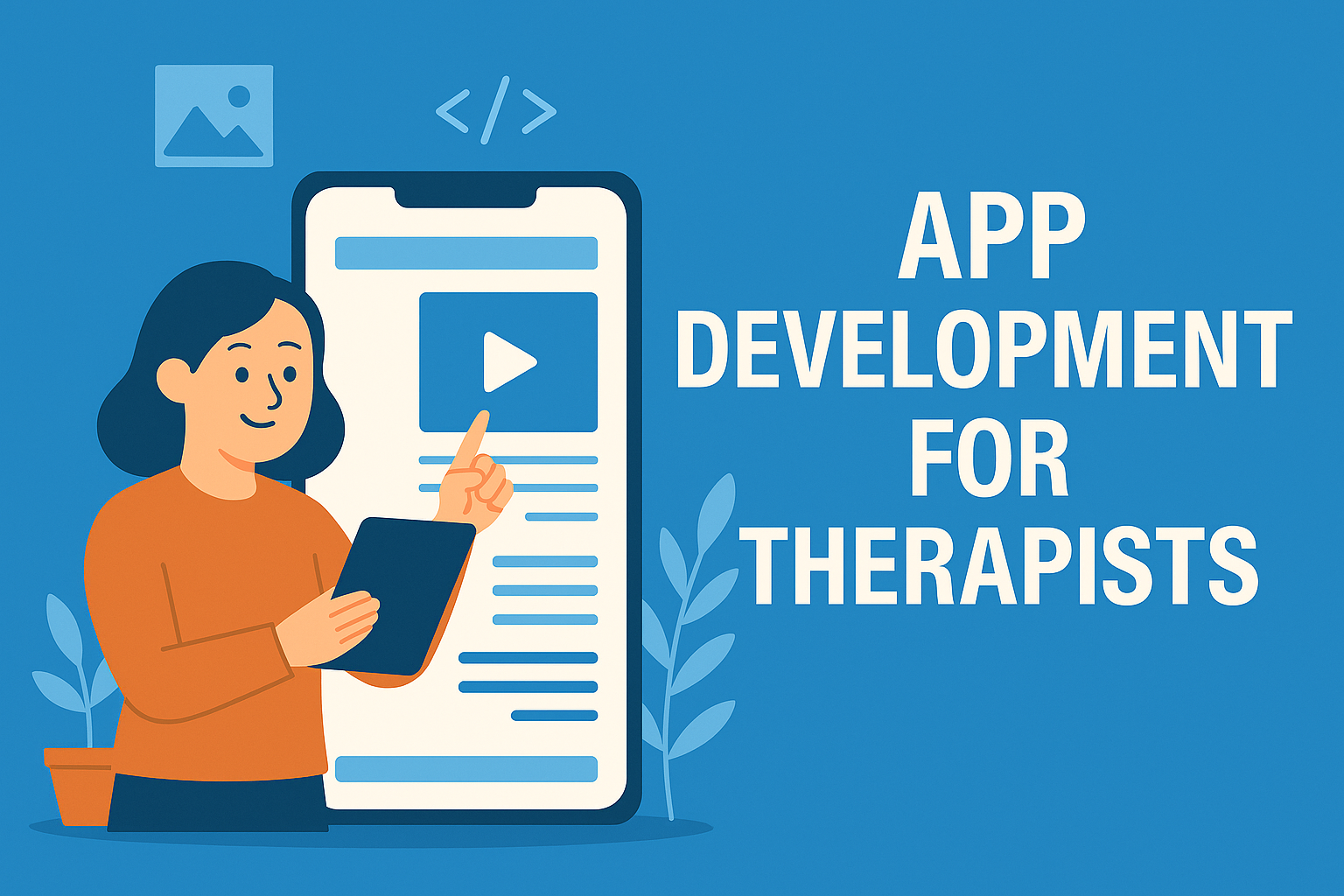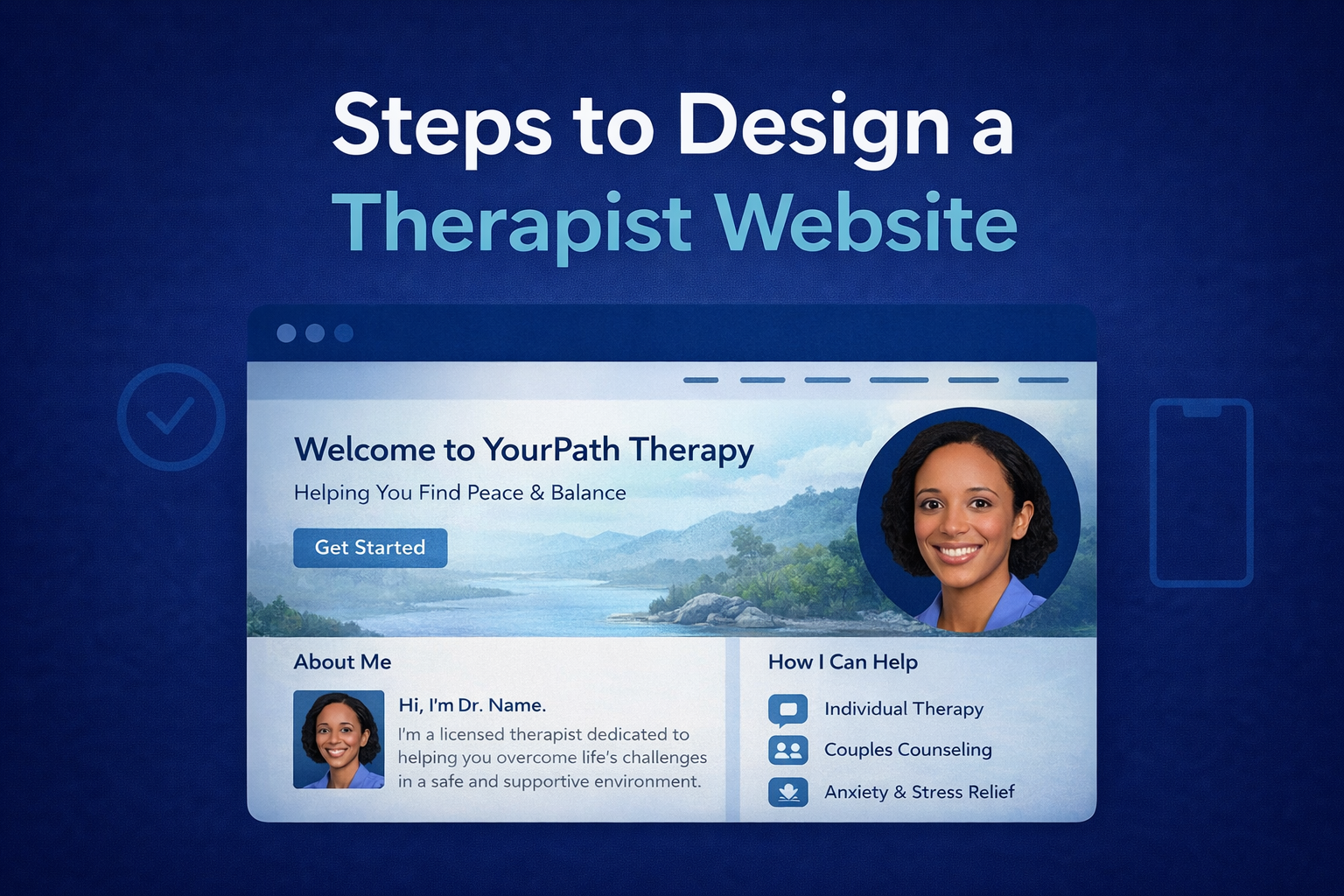App development for therapists has become more than a trend; it’s a vital part of modern mental health care. With clients expecting on-demand access to therapy tools, secure communication, and personalized care, mobile apps have become essential for delivering therapy in a flexible and client-friendly way.
The mental health industry’s digital transformation, accelerated by the pandemic, has redefined how therapists connect with clients. While professional websites remain essential, therapy apps have elevated accessibility and personalization. From appointment scheduling to journaling and self-care tools, these platforms help therapists stay connected and responsive between sessions-while also highlighting the growing importance of choosing the right keywords for therapists to improve online visibility, reach the right audience, and remain competitive in an increasingly digital mental health landscape.
As clients increasingly turn to mobile-first solutions, therapists adopting app technology are enhancing their credibility, client satisfaction, and brand growth.
This article explores everything from why therapists are investing in mobile apps to the core features, costs, technology stacks, and the future of therapy app innovation.
Learn more about the evolving mobile landscape in The Role of Mobile Apps in Expanding Your Mental Health Practice.
Why Therapists Are Investing in Mobile App Development
Modern therapy isn’t confined to four walls. Therapists are leveraging apps to enhance care continuity, automate daily tasks, and meet the digital expectations of their clients. Here’s why this investment is on the rise:
1. Enhanced Accessibility and Engagement
Therapy apps allow clients to schedule, communicate, and engage with their therapist anytime, anywhere. Features like journaling, reminders, and progress tracking improve emotional consistency between sessions.
2. Streamlined Practice Operations
Mobile apps reduce administrative load with automated scheduling, secure payments, and integrated documentation — saving time and minimizing missed appointments.
3. Better Client Retention
Push notifications, personalized reminders, and interactive features help therapists maintain consistent communication, leading to stronger therapeutic relationships and better client outcomes.
4. Competitive Advantage
A branded mobile app distinguishes your private practice, offering a modern, professional experience that builds trust and loyalty.
Read how digital innovation benefits professionals in Why Mental Health Professionals Should Invest in App Development.
Essential Features Every Therapy App Should Include
The best therapy apps balance functionality, compliance, and user comfort. Here’s a breakdown of essential and advanced features for successful therapist app development.
Client Portal and Secure Login
Provide clients with a private, password-protected space for accessing session notes, assigned exercises, and progress updates.
HIPAA-Compliant Messaging and Video Sessions
Enable encrypted chat and secure video calls within the app ensuring confidential communication and compliance with privacy laws.
Appointment Scheduling and Reminders
Integrate smart calendars that sync across devices, minimizing no-shows and scheduling errors.
Payments, Invoicing, and Practice Management Tools
Offer seamless in-app payments, automatic receipts, and integrated billing for cash-pay or insurance-based practices.
Mood Tracking, Journaling, and Resources Library
Empower clients with self-monitoring tools, downloadable materials, and mindfulness exercises to reinforce therapy goals.
Admin Dashboard for Therapists
An intuitive backend where therapists can manage clients, view reports, and access session analytics.
For more ideas on boosting engagement, see How to Improve Patient Engagement with a Mental Health App.
Ensuring HIPAA Compliance in App Development for Therapists
When building mental health apps, HIPAA compliance is non-negotiable. It protects sensitive health information, ensuring both legal compliance and client trust.
Key Compliance Measures Include:
- End-to-End Encryption: Safeguards all client communications.
- HTTPS and SSL Certificates: Secure connections between the app and servers.
- Two-Factor Authentication (2FA): Adds extra login protection.
- Data Storage Compliance: Whether hosted on secure cloud platforms or local servers, all data must meet HIPAA encryption standards.
- BAAs and Privacy Policies: Developers must sign Business Associate Agreements (BAAs) and clearly define data-handling practices.
At Mental Health IT Solutions (MHIS), we design and develop HIPAA-compliant therapy apps that prioritize privacy, security, and user experience ensuring therapists can focus on care, not compliance risks.
Types of Therapy Apps Mental Health Professionals Can Build
The type of app you develop depends on your goals, audience, and therapy model. Here are the most common categories:
Client-Facing Therapy Apps
Designed for clients to access tools like journaling, mood trackers, mindfulness exercises, and appointment management.
Therapist-Facing Apps
Support administrative tasks such as billing, note-taking, scheduling, and secure data access — ideal for larger practices or clinics.
Hybrid Therapy Apps
Combine both roles, connecting therapists and clients in a shared digital environment.
Specialized App Models
- CBT Tools: Cognitive Behavioral Therapy apps that track thought patterns and exercises.
- Mindfulness & EMDR Trackers: Designed for relaxation, trauma recovery, and anxiety management.
- Teletherapy Platforms: Enable secure video, messaging, and progress sharing.
Explore how digital formats differ in Website vs App: Which Digital Solution is Right for Your Therapy Practice?.
App Development Process and Technology Stack for Therapists
Building a mobile app for therapy practices requires careful planning, compliance, and design expertise. At MHIS, the development journey follows five structured phases:
1. Discovery and Planning
We assess your goals, audience, and required features defining user stories, technical specs, and compliance protocols.
2. Design (UI/UX)
Our team crafts a calming, accessible interface aligned with therapeutic principles. Colors, typography, and layout are chosen to evoke trust and serenity.
3. Development
Using frameworks like Flutter and React Native ensures performance on both iOS and Android. Backend systems such as Node.js, Firebase, and AWS guarantee scalability and security.
4. Testing and Quality Assurance
Comprehensive testing ensures functionality, HIPAA compliance, and usability across multiple devices.
5. Launch and Maintenance
Post-deployment support includes app store submission, updates, bug fixes, and analytics tracking to measure success.
Learn how emerging technologies enhance care in Using AI in Mental Health Apps: The Next Big Thing for Therapy Practices.
Cost of App Development for Therapists: What to Expect
Therapy app development costs depend on features, complexity, and compliance requirements. Here’s a general overview:
| App Complexity | Estimated Cost (USD) | Development Timeframe |
|---|---|---|
| Basic MVP (Essential Tools) | $8,000–$12,000 | 6–8 weeks |
| Mid-Level App (Teletherapy & Payments) | $15,000–$30,000 | 8–12 weeks |
| Advanced Custom App (AI + Analytics) | $30,000–$50,000+ | 12–16 weeks |
Factors Affecting Cost:
- Number of integrated features
- HIPAA compliance complexity
- Design customization
- Maintenance and updates
- Platform (iOS, Android, or cross-platform)
Therapists launching their first digital product can start with a Minimum Viable Product (MVP) a cost-effective way to test client response before full expansion.
Compare app and website costs in The Cost of Website vs App Development.
Marketing Your Therapy App for Maximum Reach
Once your app is live, an effective marketing plan ensures it gains traction and drives downloads.
1. App Store Optimization (ASO)
Optimize titles, keywords, screenshots, and reviews to improve visibility on the App Store and Google Play.
2. Leverage Existing Channels
Promote your app via your website, email newsletters, and social platforms. Create blog posts or videos explaining app benefits to clients.
3. Ethical Reviews and Testimonials
Encourage satisfied clients to share their experiences ethically, highlighting real outcomes without breaching confidentiality.
4. Paid Advertising Campaigns
Use Google Ads or Meta Ads targeting keywords like “therapy app” or “mental health support app” to drive qualified installs.
5. Educational Content
Showcase how your app enhances therapy outcomes through case studies, social proof, or webinar demonstrations.
The Future of App Development for Therapists: Trends and Innovations
The next generation of mental health app development is driven by emerging technologies that personalize therapy and automate engagement.
Artificial Intelligence (AI)
AI chatbots and predictive mood analysis help therapists monitor clients between sessions and offer early interventions.
Wearable Integrations
Apps connecting with wearables can monitor sleep, stress, and activity levels, allowing data-informed therapy adjustments.
Voice and Emotion Recognition
Voice-based check-ins capture emotional nuances, offering therapists valuable insights into a client’s mental state.
Data Analytics for Therapists
Built-in dashboards provide insights into session attendance, engagement rates, and therapy outcomes, helping improve effectiveness.
The future is a connected ecosystem where websites, apps, and EHR systems integrate to deliver smarter, evidence-based mental health care.
Learn how apps enhance overall digital care in Why Your Mental Health Practice Needs a Custom Mobile App.
Conclusion
App development for therapists empowers mental health professionals to combine care and technology in meaningful ways. A custom mobile app boosts accessibility, builds stronger client relationships, and ensures long-term engagement all while maintaining data security and HIPAA compliance.
At Mental Health IT Solutions (MHIS), we specialize in creating secure, HIPAA-compliant mobile apps tailored to the needs of therapists, psychologists, counselors, and private practices. Whether you want to launch a simple booking portal or a comprehensive teletherapy platform, we can turn your vision into reality.
Ready to build your therapy app?
Schedule a free consultation with Mental Health IT Solutions and discover how we can create a secure, scalable, and client-centered mobile experience for your practice.







